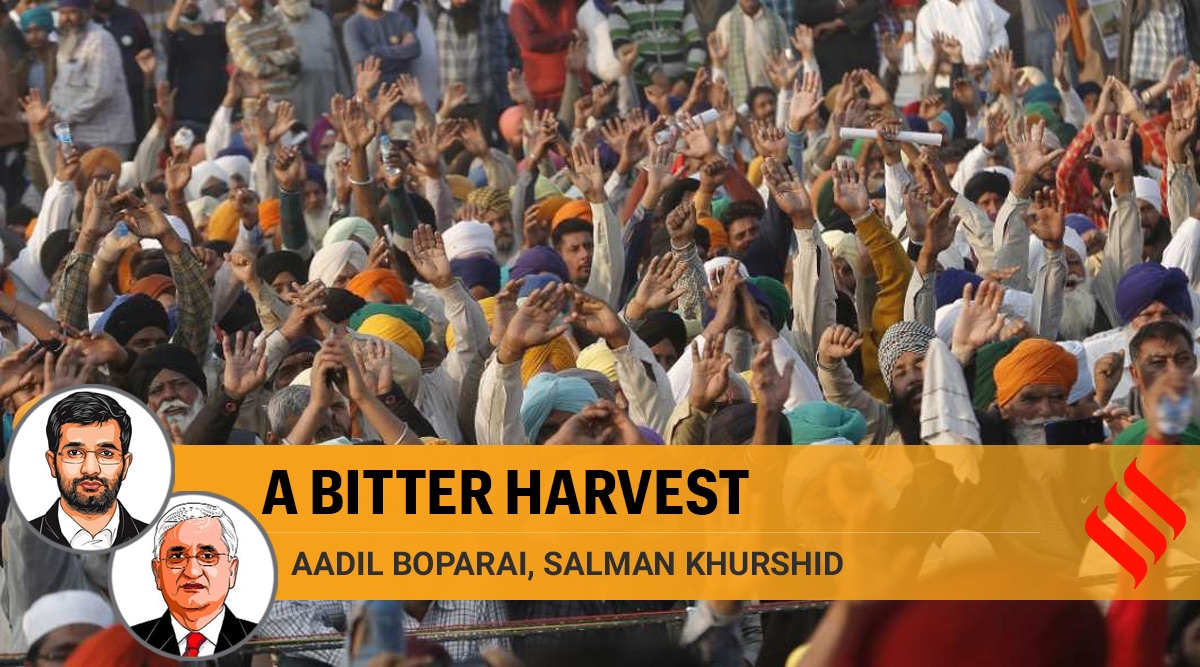 Farmers raise slogans during the ongoing protest against the Center's new farm laws, at Singhu border in New Delhi. (Express Photo: Amit Mehra)
Farmers raise slogans during the ongoing protest against the Center's new farm laws, at Singhu border in New Delhi. (Express Photo: Amit Mehra)The three recently enacted farm laws assented to by the President Ram Nath Kovind on September 27 have led to a showdown between the peasantry and the Union government. It is an undisputed fact that there was no consultation undertaken by the central government at the time of promulgating the ordinances, and subsequently, while pushing the bills through the Parliament despite repeated demands of the Congress to refer the farm bills to the standing/select committee for reconsideration and necessary consultation with all stakeholders. Clearly, the present dispensation believes that its shock-and-awe methods are to be the main medium of governance.
Notwithstanding the several pro-corporate and perceived anti-farmer provisions in the farm laws, the Union government has bypassed the federal structure by legislating on subjects that exclusively fall within the domain of the state government under the state list of the Seventh Schedule of the Constitution. The legality of this will hopefully be expeditiously decided by the Supreme Court to halt the central government’s repeated encroachment on states’ rights.
The global experience across agricultural markets demonstrates that corporatisation of agriculture without a concomitant security net in the form of an assured payment guarantee to the farmers results in the exploitation of farmers at the hands of big business. This poses a significant challenge to small and marginal farmers who constitute 86 per cent of our agricultural class. The asymmetric negotiating matrix between the famers and corporates will invariably lead to negation of their rights. The present laws alter the bargaining landscape in favour of the corporate players to the detriment of the farmers. The fact that farmers believe this to be so cannot be shrugged away.
The primary cause for concern is the systematic dismantling of the APMC mandis which have stood the test of time and have provided farmers the remuneration to keep themselves afloat. The farm laws open the field to an alternate set of markets/private yards, where the buyer will have no statutory obligation to pay the minimum support price (MSP). Since the said markets/private yards will not be charged any market fee/levy; the agricultural sector will see the gradual shifting of trade from the APMC mandis to these private yards. It is necessary to indicate that the market fee collected by the APMC mandis is used for development of rural infrastructure, link roads and storage facilities. The shifting of trade to avoid payment of any levy/market fee by private players and the Food Corporation of India (FCI) will eventually witness the redundancy of the APMC mandis, leaving the famers at the mercy of the corporate sharks.
The present farms laws expressly exclude the jurisdiction of the civil court, leaving the farmers remediless and with no independent medium of dispute redressal mechanism. The farm laws empower the Sub-Divisional Authority (executive) to adjudicate on disputes between the farmers and traders. This provision effectively shuts the doors on the farmer to approach the judicial system for resolution of claims and disputes. The increased bureaucratic control over the adjudication of disputes between the farmers and corporate players will open the floodgates for corruption and rent-seeking.
The Union government has repeatedly asserted that the farm laws will usher in an era of increased freedom of choice and enhanced income for the farmers. This begs the question: If it is certain that the new farm laws will increase the income of the farmers, then it should readily agree to have a floor price that shall not be less than the MSP and be applicable for all the markets. This will also be a crucial confidence-building measure by the Narendra Modi administration that will allay the concerns of the farmers. The government’s opposition to this reasonable demand puts their sincerity to the cause of farmers under serious cloud. Experience shows that a free market alone does not lead to higher farm income. The entire edifice of MSP is founded on the imperfections of the market. Therefore, the spiel given by the government that free markets will serve as a panacea for the farmers and their woes is furthest from the truth.
Moreover, the paltry increase in the MSP over the past few years fails to cover the input cost. The government must urgently put in place a robust system to annually re-calculate the MSP keeping in mind the rising input costs of diesel, fertilisers, etc to make farming a viable and lucrative vocation. The MSP must ensure incentives for agriculturists and not push them into a debt trap. A statutory regulator in the field of agriculture akin to regulators in other fields would fill the gap to address information access and market distortions.
Lastly, the recent trend of the incumbent government to label and discredit genuine, public protests and agitation as some form of a vile conspiracy needs to be strongly deprecated. Dissent is the safety valve in any democracy; attempts to stifle or muzzle it by using unwarranted labels do a disservice to the cause of democracy. Instead of engaging with the protesting farmers, several senior functionaries of the government resorted to name-calling to delegitimise a peaceful pan-India farmer movement. With vents sealed shut, discontent can become debilitating for the polity. The three legislative nails in the farmer’s aspirations might lead to a bitter harvest.
This article first appeared in the print edition on December 12, 2020 under the title ‘A bitter harvest’. Boparai is spokesperson for Indian National Congress; Khurshid is former minister, government of India.